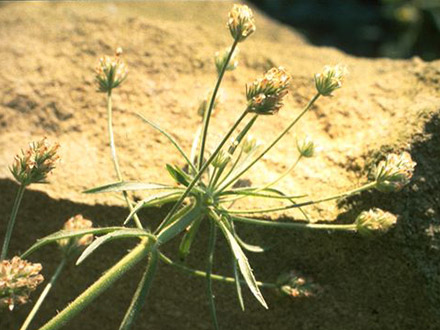Botanical name
Psyllium-plantain - Plantago afra L. (Syn. P. psyllium L.)
Family
Plantain family (Plantaginaceae)
Information about the plant
The psyllium-plantain is native to the Mediterranean (southern Europe and northern Africa) and western Asia. The genus name Plantago, derived from Latin "planta" (= foot sole, foot face) with the common suffix of plants "ago" refers in part to the flat, oval leaves of the plantain (P. major) lying closely on the ground in rosettes, on the other hand that the plantain is formed by being trampled by feet. The Psyllium-plantain, however, is characterised by small, very narrow, straight leaves. In the leaf axils of the upper leaves are the scapes with the thick blossom of small flowers in short spikes. The fruit ripens to a capsule with a two-part cover each with two small elliptical, reddish brown, shiny seeds. These are reminiscent of fleas, which has earned the plant the common name "flea herb" or "flea-seed plantain" and the synonymous Latin species name of the plant (P. psyllium) is expressed: Latin, "psyllium" (= flea), which is also kept in the drug name, (Psyllii semen).
Medicinally used parts of plants (herbal drug)
The ripe, red-brown seeds are used. The drug comes from crops in France and Spain.
Constituents of the herbal drug
Psyllium contains mucilage in the seed coat, fatty oil in the endosperm.
Quality of the drug
The quality of psyllium (Psyllii semen) is specified in the European Pharmacopoeia (Ph. Eur). According to the pharmacopoeia even the seeds of Sand-plantain (Plantago indica L.; syn. P. arenaria Waldst et Kit..) may also be used.
Medical applications
Recognised medical use
Internally for recurring constipation and irritable bowel syndrome (Commission E); with recurring constipation and softening of the stools (eg, anal fissures, haemorrhoids, following rectal examinations and pregnancy), also for "bowel care" with irritable bowel syndrome and drug-treated diverticulitis and to retain the digestive system with a low fibre diet and for short-term symptomatic treatment of nonspecific diarrhoea (ESCOP).
The HMPC has accepted the internal use of psyllium for recurring constipation and softening the stools as in painful bowel movements after rectal examinations or anal fissures and haemorrhoids and as "well-established medicinal use".
Traditional use
No listing as a traditional drug application according to § 109a
Herbal drug preparations in finished dosage forms
- whole or crushed psyllium
Preparation of a tea
25 to 40g psyllium (daily dose) taken in three equal doses with plenty of fluids (very important at least 200ml per dose). Psyllium can be taken already soaked in water, milk or juice. During therapy with psyllium an abundant intake of fluid must be guaranteed in every case.
Notes
Psyllium may not be taken in case of suspected intestinal obstruction (ileus), diseases of the oesophagus and difficulty swallowing, and with stenosis of the gastro-intestinal tract. Psyllium should also not be taken immediately before bedtime. The use in children under 6 years old is not recommended due to the lack of findings.
Side effects
If the increased fluid intake is respected, there are no side effects to expect, at worst flatulence.
Interactions
Psyllium should be taken ? to 1 hour before or after taking other medicines, as otherwise it may delay the absorption of other drugs from the gastro-intestinal tract.
References
Herbal drug monographs
HMPC, Commission E, ESCOP, WHO Vol. 1
Further literature
Wichtl: Teedrogen und Phytopharmaka, pg. 534
Schilcher: Leitfaden Phytotherapie, pg. 97
Van Wyk: Handbuch der Arzneipflanzen, pg. 245
Kommentar zum Europäischen Arzneibuch (Psyllium, no. 0858)


